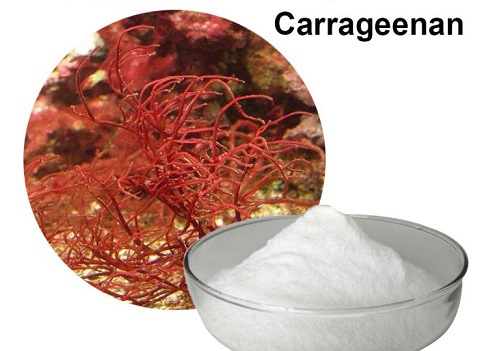Carrageenan, a Food Additive and Weight Loss Supplement Found to Disrupt Gut Barrier and Increase Risk of Diabetes
Nikhil Prasad Fact checked by:Thailand Medical News Team Nov 28, 2024 4 months, 2 weeks, 2 days, 7 hours, 20 minutes ago
Health News: A Common Additive Under Scrutiny
Carrageenan, a widely used food additive and weight-loss supplement, has come under the microscope of health researchers. Known for enhancing food texture and frequently used in low-calorie products, this seemingly harmless ingredient is now linked to disturbing effects on human health. A recent clinical study led by researchers from the University Hospital of Tübingen-Germany, the German Center for Diabetes Research (DZD), and Harvard T.H. Chan School of Public Health-USA reveals that carrageenan may disrupt gut barrier function, increase gut inflammation, and elevate the risk of developing type 2 diabetes.
 Carrageenan, a Food Additive and Weight Loss Supplement Found to Disrupt Gut Barrier and Increase Risk of Diabetes
Carrageenan, a Food Additive and Weight Loss Supplement Found to Disrupt Gut Barrier and Increase Risk of Diabetes
This
Health News report dives into the details of this groundbreaking study, offering insights into the potential health implications of consuming this common additive.
Carrageenan and the Gut Barrier
The study focused on the effects of carrageenan on intestinal health and metabolic functions. Twenty healthy male participants with an average body mass index (BMI) of 24.5 kg/m² consumed carrageenan in quantities equivalent to two to three times the typical daily intake in the United States. The results were startling: the additive significantly increased the permeability of the small intestine, a phenomenon commonly associated with "leaky gut syndrome."
"Our investigation suggests that carrageenan, similar to findings in animal studies, impairs the gut's barrier function," stated Professor Robert Wagner, one of the lead researchers. "This could lead to chronic inflammation and long-term health consequences."
Participants with higher BMI also displayed concerning changes, including reduced insulin sensitivity in the liver and increased levels of inflammatory markers in the blood.
Link to Diabetes Risk and Insulin Sensitivity
One of the study's primary goals was to assess the impact of carrageenan on insulin sensitivity - a key factor in the development of type 2 diabetes. While overall insulin sensitivity did not show significant changes across all participants, those with higher BMI experienced notable reductions in liver and whole-body insulin sensitivity. Additionally, these individuals exhibited increased markers of brain inflammation, particularly in the hypothalamus, a region critical to regulating appetite and blood sugar levels.
"These results indicate that overweight individuals might be more susceptible to the harmful effects of carrageenan," explained Professor Norbert Stefan. "Our subjects were mostly healthy, but the additive’s impact could be more pronounced in older or overweight individuals. Further research is needed to confirm these findings."
Inflammation and Gut Microbiome
Carra
geenan intake was also linked to elevated inflammatory markers, such as C-reactive protein (CRP) and interleukin-6 (IL-6). These markers suggest systemic inflammation, which plays a significant role in metabolic disorders like diabetes. Increased intestinal permeability was accompanied by elevated levels of zonulin, a protein associated with gut barrier dysfunction.
The researchers noted only minor changes in gut microbiome composition but hypothesized that carrageenan may interact with individual microbiota profiles, potentially exacerbating its inflammatory effects.
Potential Mechanisms of Harm
Carrageenan’s adverse effects may stem from its interaction with the gut’s immune cells. In laboratory tests, exposure to carrageenan activated natural killer (NK) cells and triggered the release of pro-inflammatory cytokines such as TNF-α and interferon-gamma. These immune responses could disrupt the intestinal lining, allowing harmful substances to enter the bloodstream and contribute to systemic inflammation.
Interestingly, carrageenan degradation in the gut may also play a role. Under certain conditions, the additive breaks down into smaller molecules known as poligeenans, which are linked to severe gut inflammation in animal studies.
Study Limitations and Call for Further Research
While the findings are compelling, the study has some limitations. The short duration of carrageenan exposure (two weeks) and the recruitment of only young, healthy male participants mean that the long-term effects of carrageenan on diverse populations remain unclear. The researchers emphasized the need for studies involving older adults, women, and individuals with pre-existing metabolic conditions.
"Our results suggest that carrageenan’s effects may depend on factors like BMI and gut microbiome composition," added Professor Wagner. "Future research should explore these interactions in more detail."
Conclusions: Rethinking Carrageenan in Our Diets
The study provides strong evidence that carrageenan disrupts intestinal barrier function and promotes inflammation, particularly in individuals with higher BMI. Although it did not significantly alter insulin sensitivity in the short term for healthy participants, the findings raise concerns about its long-term impact on metabolic health. Given its widespread use in processed foods, these results call for caution in consuming carrageenan-containing products.
The researchers conclude: "Our study highlights the potential health risks of carrageenan, especially for those at higher risk of developing type 2 diabetes. It is crucial to understand the full spectrum of effects this additive can have on human health. Until more is known, individuals may want to limit their intake of foods containing carrageenan, particularly if they have pre-existing health conditions or are overweight."
The study findings were published in the peer-reviewed journal BMC Medicine.
https://bmcmedicine.biomedcentral.com/articles/10.1186/s12916-024-03771-8
For the latest
Health News, keep on logging to Thailand Medical News.
Read Also:
https://www.thailandmedical.news/news/canadian-scientists-alarmingly-find-that-weight-loss-drugs-ozempic-and-wegovy-cause-heart-muscles-to-shrink
https://www.thailandmedical.news/news/proton-pump-inhibitors-ppis-impact-gut-health-by-translocating-oral-microbiota
